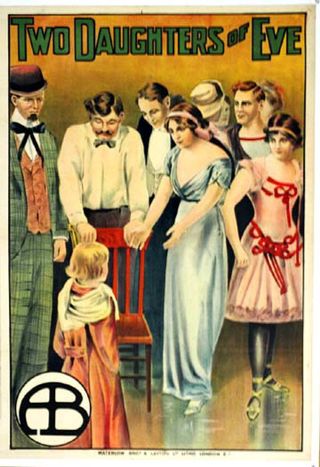Related Research Articles

Lillian Diana Gish was an American actress. Her film-acting career spanned 75 years, from 1912, in silent film shorts, to 1987. Gish was dubbed the "First Lady of the Screen" by Vanity Fair in 1927 and is credited with pioneering fundamental film performance techniques. In 1999, the American Film Institute ranked Gish as the 17th-greatest female movie star of Classic Hollywood cinema.

Dorothy Elizabeth Gish was an American stage and screen actress. Dorothy and her older sister Lillian Gish were major movie stars of the silent era. Dorothy also had great success on the stage, and was inducted into the American Theater Hall of Fame. Dorothy Gish was noted as a fine comedian, and many of her films were comedies.

Judith of Bethulia (1914) is an American film starring Blanche Sweet and Henry B. Walthall, and produced and directed by D. W. Griffith, based on the play "Judith and the Holofernes" (1896) by Thomas Bailey Aldrich, which itself was an adaptation of the Book of Judith. The film was the first feature-length film made by pioneering film company Biograph, although the second that Biograph released.

Way Down East is a 1920 American silent romantic drama film directed by D. W. Griffith and starring Lillian Gish. It is one of four film adaptations of the melodramatic 19th century play of the same name by Lottie Blair Parker. There were two earlier silent versions and one sound version in 1935 starring Henry Fonda. Griffith's version is particularly remembered for its climax in which Gish's character is rescued from doom on an icy river.

An Unseen Enemy is a 1912 Biograph Company short silent film directed by D. W. Griffith, and was the first film to be made starring the actresses Lillian Gish and Dorothy Gish. A critic of the time stated that "the Gish sisters gave charming performances in this one-reel film". The film was shot in Fort Lee, New Jersey where early film studios in America's first motion picture industry were based at the beginning of the 20th century. Consistent with practice at that time, the actors in the cast and their roles are not listed in the film..

Two Daughters of Eve is a 1912 American silent drama film directed by D. W. Griffith.

So Near, Yet So Far is a 1912 American silent drama film directed by D. W. Griffith. Prints of the film survive in the Museum of Modern Art film archive.

Gold and Glitter is a 1912 American silent drama film co-directed by D. W. Griffith and Frank Powell. Lillian Gish, in the leading female role, was praised for its variety of emotion, in comparison to her previous roles.

The Informer is a 1912 American short drama film directed by D. W. Griffith and featuring Mary Pickford, Henry B. Walthall, Harry Carey, Lionel Barrymore, Dorothy Gish, and Lillian Gish. It was filmed in the Pike County town of Milford, Pennsylvania. Prints of the film survive at the film archive of the Library of Congress.
The Left-Handed Man is a 1913 American short drama film directed by D. W. Griffith. Prints of the film survive at the film archive of the Museum of Modern Art.
The Lady and the Mouse is a 1913 American short drama film directed by D. W. Griffith. A print of the film survives. Lillian and Dorothy Gish play sisters in the film. The only other two films where the Gishes play sisters are An Unseen Enemy (1912) and Orphans of the Storm (1922).

The Battle of the Sexes is a 1914 American silent drama film directed by D. W. Griffith for the Majestic Motion Picture Company. No complete print of the film is known to exist; however, a fragment has survived. Griffith remade the film as The Battle of the Sexes in 1928 as a comedy-drama and this latter version is available on DVD.

The Lost House is a lost 1915 American short drama film directed by Christy Cabanne and starring Lillian Gish.

The Children Pay is a surviving 1916 American silent drama film directed by Lloyd Ingraham and starring Lillian Gish.
Lillian Gish in a Liberty Loan Appeal is a 1918 American silent short film directed by D. W. Griffith. Produced to support the Liberty bond drive of 1918, the film is now considered to be a lost film.

The Greatest Thing in Life is a 1918 American silent drama film about World War I, directed by D. W. Griffith and starring Lillian Gish, Robert Harron, and David Butler. The film is now considered lost as no prints are known to exist.

A Romance of Happy Valley is a 1919 American drama film directed by D. W. Griffith and starring Lillian Gish. Believed lost for almost 50 years, a print was discovered in 1965 in the State Film Archives of the Soviet Union, which donated it to the Museum of Modern Art.

Romola is a 1924 American silent drama film directed by Henry King and shot on location in Italy. The film stars Lillian Gish, Dorothy Gish, William Powell, and Ronald Colman, and is based on the 1863 George Eliot novel of the same name.

The Enemy is a 1927 American silent drama film directed by Fred Niblo and starring Lillian Gish, Ralph Forbes and Ralph Emerson. Actor Joel McCrea made an early appearance as an extra.
The Little Tease is a 1913 silent black and white drama film directed by D. W. Griffith, produced by Biograph Company and starring Henry B. Walthall and Mae Marsh.
References
- ↑ "Progressive Silent Film List: Man's Enemy". Silent Era. Retrieved March 7, 2010.